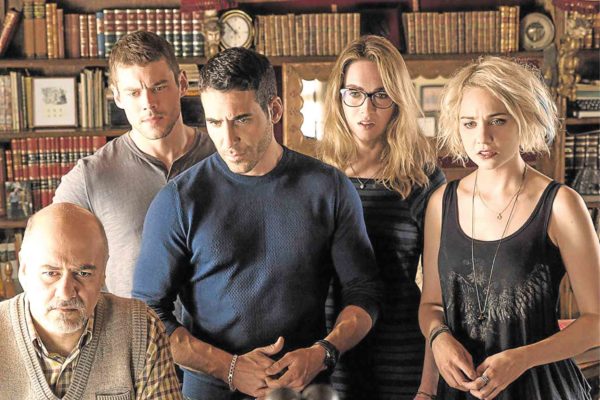BOGOTA, COLOMBIA—Just one look at Miguel Angel Silvestre would convince you why he’s a snug fit for the role of egotistical bullfighter El Primero in the adorable animated film, “Ferdinand” (which boasts a 71-percent rating on Rotten Tomatoes): His charm accentuates his talent and zesty enthusiasm.
Before the dashing 35-year-old Spanish heartthrob made a name for himself in Netflix’s well-loved series “Sense8” and “Narcos,” Miguel’s diverse persuasions weren’t anything to scoff at. He was a tennis player who had to quit the sport when he suffered a shoulder injury.
The actor then studied drama, physical theater, modern dance and acrobatics, performed onstage (Sam Shepard’s “True West”), won acting awards (“Zhao,” “Sin Tetas No Hay Paraiso”), and was directed by the impressive likes of Pedro Almodovar (“I’m So Excited”).
Moreover, with those dreamy eyes and smoldering good looks, is it any wonder why he won the Mr. Castello pageant in 2002?
In “Narcos,” the actor portrays the Cali Cartel’s Harvard-educated henchman Franklin Jurado, who ran the biggest money-laundering scheme in history. He deposited the money from cocaine sold in the United States by the Rodriguez Orejuela brothers’ crime organization, and transferred it to more than 100 accounts in 68 banks in European countries.
In “Sense8,” Miguel portrays Lito Rodriguez, a closeted Spanish actor living in Mexico with his boyfriend, Hernando Fuentes (Alfonso Herrera). He is one of the series’ eight sensates.
“I like living in extremes,” Miguel beamed as he explained to the Inquirer why he loves pursuing different endeavors in life. “It makes the rest of life’s challenges easier to hurdle.”
Our chat with Miguel:
“Sense8” will wrap up its final season with a two-episode finale later this year. How does it feel to have fans whose adulation for you is as effusive as their love for “Sense8” and “Narcos,” two shows that are celebrated for supporting diversity and unconventional casting choices? It’s flattering. My role in the third season of “Narcos” may have been fleeting, but even before it was offered to me, I was already a huge fan of the show. So, it was perfect timing when I was asked to play Franklin Jurado, because the offer came while I was on a break from shooting the second season of “Sense8.” I also saw it as a great opportunity to work with Pedro Pascal.
Shuttling proficiently between a drug-addicted money launderer and a gay character displays a measure of versatility and skill. How different is playing one from the other? I enjoyed playing both roles. But, I don’t think Lito and Franklin would ever get along well if they knew each other (laughs). Lito is friends with everybody, but the worlds they navigate are poles apart.
They have something in common, though: They’re always looking for love and seeking affirmation from the people they interact with. Lito’s ambition comes from a place of innocence. He wants to be seen, and the best way to do that is to be an actor in a soap opera.
On the other hand, Franklin is an orphan who was adopted by the cartel when he was a boy, so running its dirty errands is a way to repay the brothers for taking care of him.
They’re the only family he knows. He went to Harvard and thereafter returned to Colombia to “hide” the cartel’s money trail.
They’re both ambitious—but in different ways. When you portray these characters, in order to make them “real,” you need to understand where the source of their “weaknesses” and bad decisions is coming from … because that’s what makes them vulnerable and “relatable” to viewers.
It’s your job to put some sense into their motivations, and the best way to do that is to understand why they do what they do.
Is it more challenging to essay roles that are based on real people than fictional ones? Because true-to-life characters have families who may not agree with how the character is depicted. Playing a real character is scary, to be honest. In my case, we didn’t know much about Franklin, because he grew up an orphan.
My directors and producer had more information about him than I did, so I had to follow their lead.
But, in my approach to the character, it was important to show how much Franklin had wanted to provide for his wife Cristina (Kerry Bishé), who comes from a wealthy family.
Franklin wants to give her whatever she wants, because he grew up poor—a source of frustration that eventually creates a level of violence underneath all that ambition. His and Cristina’s love story had an incredible start—but, in the beginning, she was in the dark and didn’t know what was going on with Franklin’s life.
When she realized the kind of life her husband was leading, she started to do coke. That’s the big contradiction in their romance that creates trouble and marital tension.
You have a truly fascinating career arc. You were a promising tennis player who became a pageant titleholder. But, you also dabbled in physical theater, dance and acrobatics. What do you get out of these very diverse persuasions? That’s true (laughs). I always think that the more experience you have … and the more passion you show for the things you do … the better actor you become.
Some of the things I’ve learned from those different endeavors go against what I do right now. Like, when you compete as a tennis player, you compete against the person in front of you. You try to be better than your competitor.
But, when you perform, it’s the opposite. You work hand in hand and, sometimes, when you do well what you’re expected to do, you make the other person [look better]—and that’s not always a bad thing.
Because I’ve done a lot of different things, it’s easier for me to shuttle from one extreme experience to another.
That’s how you connect one from the other—and the reason why I think living in extreme circumstances has its advantages.
